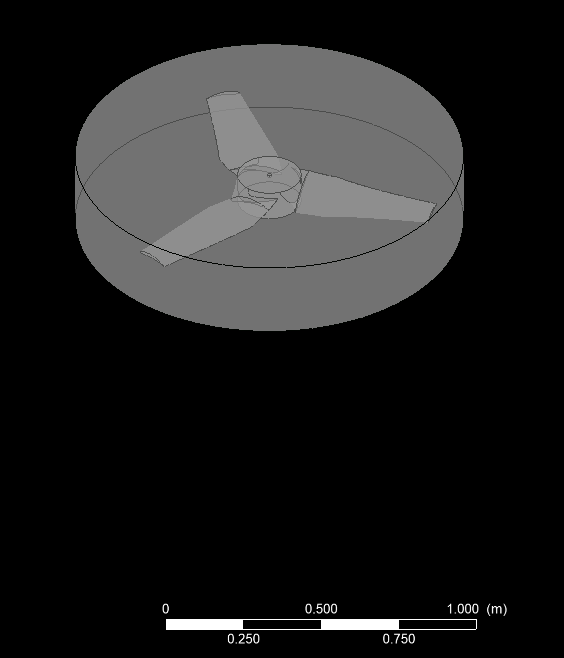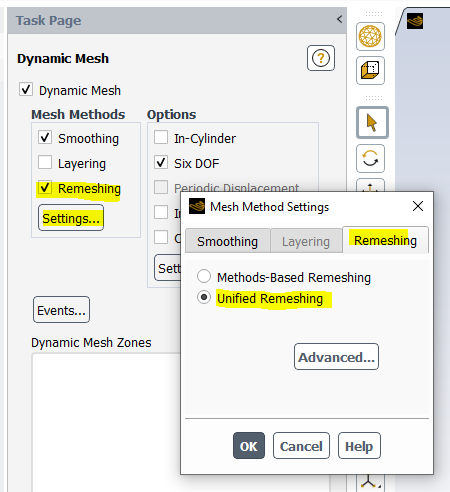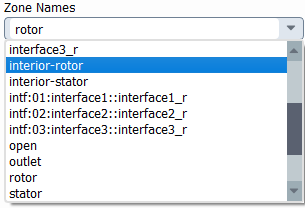-
-
August 8, 2024 at 1:54 pm
Enzo R
SubscriberI am a beginner in Ansys. I am simulating a river turbine and want to determine the power output. I have two parts, the rotor (which is a rectangle) and the stator (cylindrical), the stator encloses the rotor and the rotor encloses the turbine. I want to simulate the turbine as a rigid body with the Dynamic Mesh - 6DOF option in Fluent, but I have doubts about the zones of the dynamic mesh, I don't know how to assign the type of the zones, the tubine wall is going to be the rigid body, but everything else I have no idea if it has to be rigid body or deformable or stationary, etc. I would be very grateful if someone could send me a video tutorial or advice.
-
August 8, 2024 at 2:03 pm
Federico
Ansys EmployeeHello Enzo, could you post some screenshots of your model?
Technically, you may only need to set the rotor to Rigid Body motion, but the rest will depend on the topology of your model.
-
August 8, 2024 at 8:25 pm
-
August 9, 2024 at 1:15 pm
Federico
Ansys EmployeeThank you! Now, do you have a Mesh interface between the rotor (fluid cylinder) and stator (Option 1) ? Or does the cylinder and stator share a conformal mesh (Option 2)?
For Option 1: you can add the cylindrical fluid zone with the same Rigid body motion as your turbine. Just set the 6DOF option to Passive. This will rotate both the fluid cell zone with the turbine together and will avoid having to remesh the cylindrical fluid zone to accomodate the turbine motion.
For Option 2: you should only need to assign Rigid body motion to the turbine walls. Just make sure you have the Remeshing option turned On with Unified Remeshing.
-
August 9, 2024 at 1:24 pm
-
-
August 9, 2024 at 1:52 pm
Enzo R
SubscriberYes, I have a Mesh Interfaces between the rotor and stator. So, I'm going to set the 6DOF option to passive for the cylindrical fluid zone. Can I assign the stator as stationary or it is unnecesary? and the zone names that I am going to set the 6DOF option to passive are going to be all the zones that make up the rotor, such as the rotor itself, the (3) interfaces and the interior - rotor?
And will all the zone names with the "6DOF option to passive" of the rotor have the same 6DOF properties (mass, moment of inertia) as my turbine, or will I have to assign another 6DOF properties for those zone names?
-
August 9, 2024 at 2:26 pm
Federico
Ansys EmployeeFor option 1, you should set the turbine walls with Rigid body motion with the proper 6DOF properties/motion. Set the cylindrical fluid cell zone to Rigid Body motion with passive 6DOF. This will make sure that all boundaries associated with this cell zone rotate together, while the Passive option tells the solver to not account for the forces on this zone for the 6DOF calculations.
That is all you need. By default, all other zones will be set as Stationary, but you do not need to explicitly assign them.
-
-
August 9, 2024 at 4:34 pm
Enzo R
SubscriberUnderstood! I have another question. In the mesh methods part, should I use the Smoothing and Remeshing? If I use Smoothing which method should I apply, Difussion or Spring/Laplace/Boundary Layer? and If I use Remeshing should I use the Unified Remeshing?
Thanks for your replies!
-
August 9, 2024 at 4:55 pm
Federico
Ansys EmployeeFor Option 1, there shouldn't be any remeshing occuring, since the entire cylinder will rotate along with the turbine blades (both are rigid bodies). If you do not have any other dynamic mesh zones, I would invite you to try it without Smoothing or Remeshing. This would greatly speed up your calculation.
-
-
August 9, 2024 at 5:25 pm
Enzo R
SubscriberYes, I don't have any other dynamic mesh zones. I'll try to calculate without Smoothing or Remeshing. Do you have any recommendation for the turbulence model? I'm currently using the k - w SST, or will it depend on the accuracy I want to get for my calcutions?
-
August 9, 2024 at 5:29 pm
Federico
Ansys EmployeeYes, the turbulence model will depend on the flow regime and accuracy you need. Scale resolving models will have strict meshing requirements compared to RANS.
k-w SST will work for most practical applications.
I invite you to make a new post if you want to have a Turbulence discussion to not mix topics within a post :)
-
-
August 9, 2024 at 6:04 pm
Enzo R
SubscriberGot it! I'll make a new post for the turbulence model. Thanks for your help, I really appreciate your advice!
-
- You must be logged in to reply to this topic.


- air flow in and out of computer case
- Varying Bond model parameters to mimic soil particle cohesion/stiction
- Eroded Mass due to Erosion of Soil Particles by Fluids
- I am doing a corona simulation. But particles are not spreading.
- Centrifugal Fan Analysis for Determination of Characteristic Curve
- Issue to compile a UDF in ANSYS Fluent
- Guidance needed for Conjugate Heat Transfer Analysis for a 3s3p Li-ion Battery
- JACOBI Convergence Issue in ANSYS AQWA
- affinity not set
- Resuming SAG Mill Simulation with New Particle Batch in Rocky

-
4177
-
1487
-
1363
-
1194
-
1021

© 2025 Copyright ANSYS, Inc. All rights reserved.












